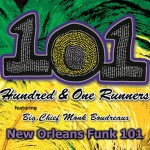 Conga master Chris Jones grew up listening to the Mardi Gras Indians at Second and Dryades. Jones remembers “beating on a 40-ounce beer bottle for hours with Geechee Johnson” and became close friends with Big Chief Bo Dollis of the Wild Magnolias.
Conga master Chris Jones grew up listening to the Mardi Gras Indians at Second and Dryades. Jones remembers “beating on a 40-ounce beer bottle for hours with Geechee Johnson” and became close friends with Big Chief Bo Dollis of the Wild Magnolias.
Jones came back to New Orleans in 2005 after the federal flood and got a unique chance to return the favor to his feathered friends when Hank Staples asked him to put together a Mardi Gras Indian tribute band at a time when Indians were scarce. With help from Johnson and a couple of other friends, Jones held one of the first Mardi Gras Indian performances in the city post-Katrina even though he’s not an Indian himself. Jones called his group the 101 Runners after the ad hoc group of unaffiliated Indians who would meet up on Mardi Gras even though they didn’t belong to a specific tribe.
One gig led to another, Indian vocalists dug what was happening and joined in, and the 101 Runners continued to roll, playing several notable gigs including the 2006 Jazz Fest and the 2008 Voodoo Fest.
This show from Tipitina’s catches lightning in a bottle. Through an ironic turn of chance, the Runners inherited June Yamagishi, formerly of the Wild Magnolias, for this gig. Yamagishi’s versatility allowed him to step right into his new role. He adjusted his tone away from the fuzz distortion that Bo Dollis clearly enjoyed into a cleaner, tenor-like tone that cuts effectively through the Runners’ arrangements—more Santana than Hendrix, but always Yamagishi. He takes three solos on this set that levitate the band—a flying series of choruses pitted against a maelstrom of drums in “Shotgun Joe,” a centerpiece showcase in “Sew, Sew, Sew” and the furious coda that brings the set to its apogee on “Shallow Water.”
The drummers—Jones on congas, Ajay Mallery on the trap set, Lionel Batiste, Jr. on bass drum, Boubacaar Cissikko on African drum, Ike “The Running Drummer” Kinchen on percussion—deliver a lively, surging pulse throughout, providing the setting for inspired declamations by the vocalists. Big Chief Monk Boudreaux of the Golden Eagles and War Chief Juan Pardo of the Golden Comanches sound totally at home as they throw down, offering a workshop on how to enliven these folk tales with personal observations. On “Old Black Johnny,” Monk tells the story of his mentor, who didn’t mask as a Mardi Gras Indian and didn’t even live in New Orleans but came every year to encourage the boy Monk, telling him he’d eventually be a Big Chief.
“You just keep singing,” Monk remembers John telling him. “They gonna hear you one day.”
With “Old Black Johnny” alone, the 101 Runners have added an important page to the Mardi Gras Indian lore. Now that this band is so well-documented we can add another story to the ongoing tale of music’s rediscovery in post-Katrina New Orleans.




